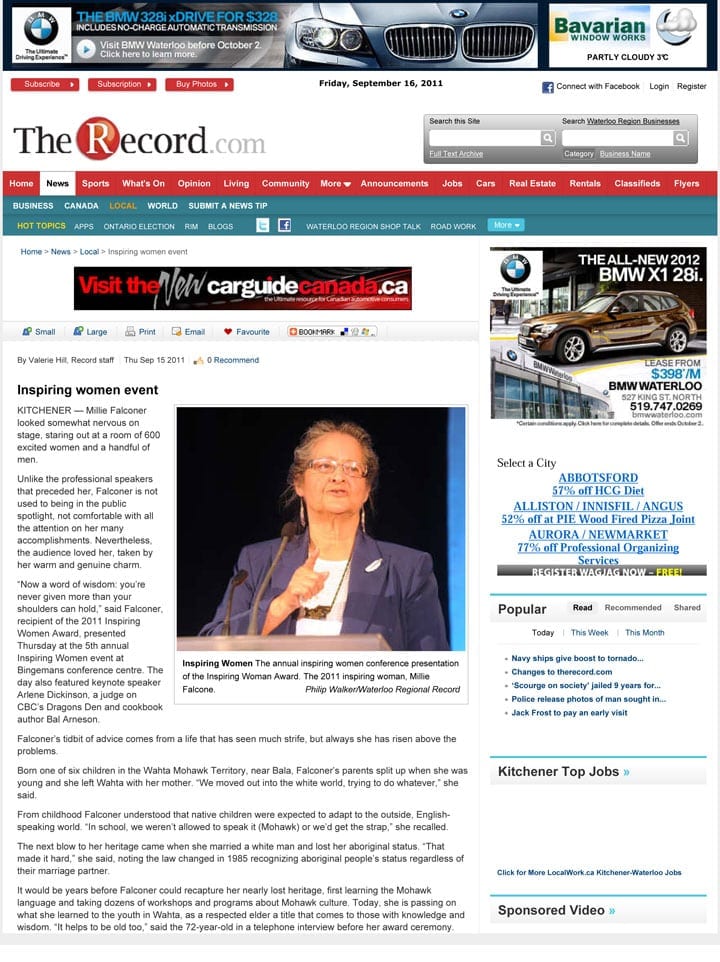
- Wholesale Items
- Promotional Products
- Promotional Apparel
- Promotional Printed T-Shirts
- Promotional Bags
- Promotional Drinkware
- Promotional Umbrellas
- Promotional Gifts
- Promotional Food & Beverages
- Promotional Golf Products
- Promotional Office Accessories
- Promotional Writing Instruments
- Promotional Keychains & Flashlights
- Awards & Medals
- More...
- Kits for a Cause
- Clearance
Inspiring Women Event
 KITCHENER — Millie Falconer looked somewhat nervous on stage, staring out at a room of 600 excited women and a handful of men.
KITCHENER — Millie Falconer looked somewhat nervous on stage, staring out at a room of 600 excited women and a handful of men.
Unlike the professional speakers that preceded her, Falconer is not used to being in the public spotlight, not comfortable with all the attention on her many accomplishments. Nevertheless, the audience loved her, taken by her warm and genuine charm.
“Now a word of wisdom: you’re never given more than your shoulders can hold,” said Falconer, recipient of the 2011 Inspiring Women Award, presented Thursday at the 5th annual Inspiring Women event at Bingemans conference centre. The day also featured keynote speaker Arlene Dickinson, a judge on CBC’s Dragons Den and cookbook author Bal Arneson.
Falconer’s tidbit of advice comes from a life that has seen much strife, but always she has risen above the problems.
Born one of six children in the Wahta Mohawk Territory, near Bala, Falconer’s parents split up when she was young and she left Wahta with her mother. “We moved out into the white world, trying to do whatever,” she said.
From childhood Falconer understood that native children were expected to adapt to the outside, English-speaking world. “In school, we weren’t allowed to speak it (Mohawk) or we’d get the strap,” she recalled.
The next blow to her heritage came when she married a white man and lost her aboriginal status. “That made it hard,” she said, noting the law changed in 1985 recognizing aboriginal people’s status regardless of their marriage partner.
It would be years before Falconer could recapture her nearly lost heritage, first learning the Mohawk language and taking dozens of workshops and programs about Mohawk culture. Today, she is passing on what she learned to the youth in Wahta, as a respected elder a title that comes to those with knowledge and wisdom. “It helps to be old too,” said the 72-year-old in a telephone interview before her award ceremony.
Every few weeks, Falconer drives alone to Wahta to help pass on to the youth what she knows about their culture. “A lot of the young people are getting interested now,” she said.
Falconer has also been a long time volunteer in her adopted community of Kitchener, as a puppeteer with the Independent Living Centre and at 50, she returned to school to become a practical nurse, working at Freeport Hospital for a decade until a blood clot nearly killed her. She has been a craftswoman, an entrepreneur and today she is most proud of her 54-year marriage, three children and many grandchildren.
She has learned that no matter how much pain you feel at any personal tragedy, you are never alone.
Her words resonated with the women in the room, women who had come to share their stories with each other and listen to several remarkable speakers. Shevaun Voisin, editor and publisher of Motivated Magazine talked about never letting anyone else’s words limit you. In her issue featuring billionaire businessman Sir Richard Branson, he revealed he’d had learning disabilities in school and was told he wouldn’t amount to much.
She talked about the many “massive success stories” she has heard, and how many were people who had dropped out of school.
Voisin then conducted an onstage interview with Jody Steinhauer, president of the Bargains Group, Canada’s largest discount wholesaler and Laura Robinson, co-creator of the board game Balderdash and creator of a game show recently picked up by CBS as a pilot.
Steinhauer said she came from a family of high academic achievers, doctors and lawyers so when she informed her family she was headed for a career in fashion, they were horrified. At least until she started earning three times the annual salary of family members.
“Every day, we have those naysayers around us,” said Steinhauer. “We’re a bit wacky because we’re entrepreneurs.”
It was that wackiness, that determination not to do what was expected that resulted in tremendous success for Steinhauer and for Robinson, she learned to look at failure and problems as turning “Oh God, to thank God.”
Olympian Silken Laumann, had her own story to tell and it began with a girl being inspired after watching Romanian gymnast Nadia Comaneci win gold at the Montreal Olympics in 1976. Laumann decided then and there she wanted to be a gymnast.
Growing to a muscular 5’ 11” she soon readjusted her goal and took up rowing and in that now infamous moment in 1992, she crossed the finish line in Barcelona to take bronze.
What made that historical moment inspiring was that only 10 weeks earlier her leg had been severely injured in a training accident and doctors told Laumann her career as an Olympian was over. They couldn’t have been more wrong.
“It’s a real touchstone in my life,” she said, holding the medal between her fingers. “Because it reminds me of what’s possible when we don’t limit ourselves.”
Laumann talked about the baggage everyone carries with them, the guilt of perceived errors of the past, the doubt about our abilities and how important it is to push those thoughts aside.
Again she referred to her bronze medal: “I believe we all have one of these”.




